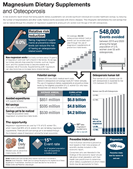 Washington, D.C., June 11, 2014—Just because National Osteoporosis Month has come to an end doesn’t mean we can disregard the importance of bone health and strategies for keeping our bones at their strongest. We need to do things year-round, such as participating in weight-bearing exercises, eating foods rich in calcium, and adding calcium and magnesium supplements when our diet falls short. In fact, when it comes to supplementation, a 2013 survey found 20 percent of all U.S. adults take supplements to support bone health, including 26 percent of all U.S. women.1 And a new economic report demonstrates that the benefits of specific supplementation can extend well beyond preventive health.
Washington, D.C., June 11, 2014—Just because National Osteoporosis Month has come to an end doesn’t mean we can disregard the importance of bone health and strategies for keeping our bones at their strongest. We need to do things year-round, such as participating in weight-bearing exercises, eating foods rich in calcium, and adding calcium and magnesium supplements when our diet falls short. In fact, when it comes to supplementation, a 2013 survey found 20 percent of all U.S. adults take supplements to support bone health, including 26 percent of all U.S. women.1 And a new economic report demonstrates that the benefits of specific supplementation can extend well beyond preventive health.
The report, “Smart Prevention—Health Care Cost Savings Resulting from the Targeted Use of Dietary Supplements,” conducted by Frost & Sullivan through a grant from the Council for Responsible Nutrition Foundation (CRNF), indicates that for U.S. women aged 55+, taking magnesium supplements at the preventive intake levels identified in the report (100 mg) can reduce the risk of having an osteoporosis-related medical event by six percent and lead to significant individual and societal health care savings.
“It’s widely known that taking calcium supplements for bone health is a smart idea, from a health prevention standpoint, as they can play a significant role in helping to hinder bone-related conditions such as osteoporosis,” said Steve Mister, president, CRNF.
“Perhaps what’s less known is the role of magnesium in bone health. This economic report reinforces the importance of magnesium supplements, shedding light on the other side of the coin—those who are already coping with osteoporosis—and how taking magnesium supplements not only provides a health benefit, but a financial one, as well, through helping prevent medical events related to osteoporosis. Falls and bone breaks are not only painful, but costly.”
In particular, the report indicates that if women over the age of 55 with osteoporosis take magnesium supplements at preventive levels, the following economic impacts can be seen over the next several years:
- 548,000 osteoporosis-related medical events can be avoided between 2013 and 2020;
- $6.8 billion in avoided expenditures could be realized cumulatively between 2013 and 2020; and
- $4.8 billion in savings could be realized cumulatively between 2013 and 2020.
“The report’s financial findings are most important to those women 55+ currently managing osteoporosis, which is expected to rise 13 percent through 2020. According to CRN’s research, only 11 percent of these women take magnesium supplements, which means 89 percent still have yet to benefit,” said Mr. Mister. “Given how costly managing osteoporosis and disease-related events can be, we encourage people to consider the impactful role magnesium supplements can play on their bodies and the nation’s health care wallet.”
Magnesium, found largely in our bones, is lost as we age, causing weaker bones and an increased risk for bone breaks. Taking magnesium supplements, costing on average nine cents per day at preventive intake levels, according to the Frost & Sullivan report, can help stop bone loss or increase bone mineral density.
To achieve the report findings, Frost & Sullivan conducted a systematic review of scientific research in peer-reviewed, published studies that looked at a relationship between magnesium supplement intake and the risk of an osteoporosis-attributed event. The firm then projected the rates of osteoporosis-attributed medical events across U.S. women over the age of 55 with osteoporosis and applied a cost benefit analysis to determine the cost savings if people in this targeted population took magnesium supplements at preventive intake levels.
The full Frost & Sullivan economic report and accompanying materials, including a magnesium supplement infographic, are available for free at www.supplementforsmartprevention.org
1 2013 CRN Consumer Survey on Dietary Supplements
Note to Editor:
About the CRN Foundation: The CRN Foundation was established in 2009 as a non-profit 501(c)(3) organization for the purpose of educating people about the beneficial, safe and responsible use of dietary supplements and their ingredients as part of a culture of wellness.
About the Council for Responsible Nutrition: The Council for Responsible Nutrition (CRN), founded in 1973, is a Washington, D.C.-based trade association representing 100+ dietary supplement manufacturers, ingredient suppliers, and companies providing services to those manufacturers and suppliers. In addition to complying with a host of federal and state regulations governing dietary supplements in the areas of manufacturing, marketing, quality control and safety, our manufacturer and supplier members also agree to adhere to additional voluntary guidelines as well as to CRN’s Code of Ethics. Visit www.crnusa.org and www.lifesupplemented.org. Follow us on Twitter @crn_supplements and @wannabewell and on Facebook.
About Frost & Sullivan: Frost & Sullivan, the Growth Partnership Company, works in collaboration with clients to leverage visionary innovation that addresses the global challenges and related growth opportunities that will make or break today's market participants. For more than 50 years, they have been developing growth strategies for the global 1000, emerging businesses, the public sector and the investment community.

